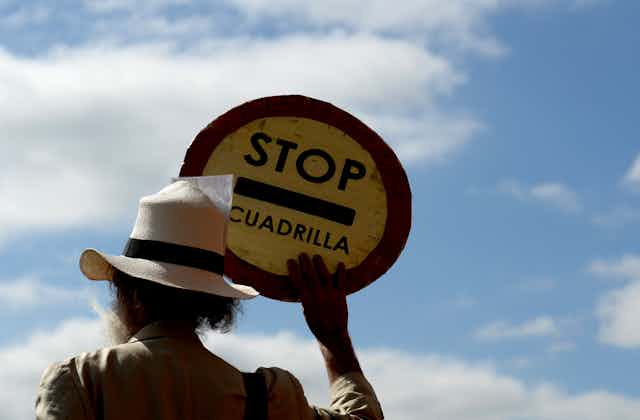When a county council in the north of England refused to grant planning permission for a shale gas site back in June 2015, it was hailed as a victory for anti-fracking campaigners and concerned locals. The UK secretary of state for communities and local government, Sajid Javid, has now overruled this decision. Fracking will go ahead in Lancashire after all.
The planning authority’s initial position clearly reflected a high level of public concern over the local impacts of the proposed fracking site. But the government’s move sends a clear message: councils who refuse applications not only face the challenge of an appeal, but also the potentially huge cost of defending their decisions in court. This could have big implications for local decision making and everyone affected by proposed fracking sites. However, in the long run, this overruling may actually harm the UK shale industry.
My research shows that there is already an extreme deficit of trust in the UK planning system. People view planning authorities and local councils as being under significant policy pressure to allow shale gas exploration. This perception is not unfounded. The government has not only declared its explicit support for shale gas and fracking, but has also actively changed the law on subsurface trespass to facilitate underground drilling.
There’s now a strict time limit, 16 weeks, for fracking-related planning applications. Given that many planning authorities won’t have much experience of dealing with oil and gas developments, this deadline may prevent detailed consideration of local impacts. Such decisions must also be made in accordance with the UK’s national planning framework which explicitly emphasises the economic importance of mineral extraction.

But how can fracking decisions be seen as legitimate if local decisions and local concerns are simply vetoed? The overrule is all the more surprising given that last year new wind farm planning guidance stressed that locals should have the final say.
Yes, in the short term it has enabled the development of at least one new exploration site. Yet if people don’t regard the Lancashire decision as legitimate and see this instead as a case of central government imposing on locals, then opposition is likely to increase.
The perception of independence is crucial here, along with the ability of planning authorities to assess fracking risks for themselves. My research found people simply don’t trust planning decisions if it seems central government or energy companies have had too much influence.
Lancashire council’s initial refusal back in 2015 was a landmark in this sense, as it gave substantial weight to local concerns about noise or unsightly construction. It showed that councils and the planning system were concerned about local impacts and were independent enough to stick up for their residents if they felt fracking wouldn’t improve the area.
But the government’s move to approve fracking in Lancashire anyway shows that any attempts by councils to make independent decisions which counter Westminster policy are likely to be overturned. Without this independence, the public will neither trust the planning authority to make these judgements nor accept the decisions they do make.
So why did the government take this action? After all, parliament has made a deliberate choice to leave fracking decisions to local planning authorities.
In England and Wales, major developments such as power plants, motorways or airports can be designated as: “Nationally Significant Infrastructure Projects” which means they bypass local councils and planning decisions are automatically made by the secretary of state.
There has been some debate over whether fracking should fit in this category. However the decision not to categorise shale gas exploration and fracking as an NSIP, made in a 2012 consultation on infrastructure, implies a commitment to local decision-making and local concerns. Yet what has happened in practice doesn’t reflect this. A system where the communities secretary decides all appeals relating to fracking – and, based on the existing precedents, dismisses the local reasons for refusal – looks set to undermine any residual trust that is placed the current planning system.
The government’s decision looks set to exacerbate public concern regarding fracking. If people don’t trust the planning system to take account of and address local concerns, independent of national politics, its legitimacy is diminished. Given local opposition to fracking can be very effective, this may not be the landmark advance for the UK shale gas industry that it first appears.

